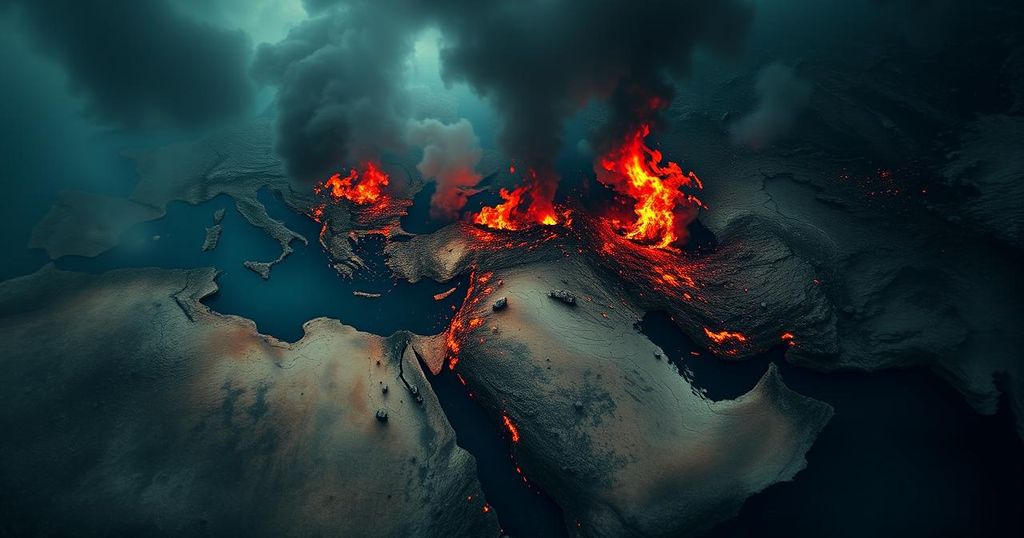Iranian militias in Iraq have intensified attacks on Israel, launching around 40 strikes in two weeks following a shift in tactics due to challenges faced by Hezbollah. The increase in hostilities underscores Iran’s strategy of employing various proxy forces amidst heightened regional tensions, especially after major events that have weakened established players like Hamas and Hezbollah.
Iran-backed militias in Iraq have accelerated their hostilities against Israel, launching approximately 40 attacks involving drones, missiles, and rockets over the past few weeks. This surge in aggressive actions began in October 2022 amid the renewed conflict in Gaza and has markedly intensified following the assassination of Hezbollah leader Hassan Nasrallah by Israeli airstrikes on September 27, 2023. Hezbollah, a formidable faction established with Iranian support over four decades ago, remains a central figure in Iran’s extensive network of Middle Eastern militias. With the diminishing strength of Hamas after prolonged warfare in Gaza and Hezbollah facing sustained Israeli military pressure, Iran has been compelled to leverage lesser-known proxy forces to demonstrate support for its steadfast ally, Hezbollah. Michael Knights, an analyst with the Washington Institute, has noted a dramatic increase in missile and drone attacks emanating from Iraq, driven by a desire among local militias to affirm their allegiance to Hezbollah. The relative capabilities of these militias are inferior to Hezbollah, prompting a sense of urgency to compete with other factions within Iran’s so-called “axis of resistance.” He posits that the Iraqi militias are wary of overshadowing by more aggressive players like the Houthis, who have also escalated operations against Israel. Further complicating the regional landscape, analysts underscore the potential risks posed by Iran’s proxies in Syria, Iraq, and Yemen, particularly as Israel deliberates its responses to aggressive missile threats from Iran. Israel has executed numerous airstrikes across Syria, targeting Iranian-affiliated installations as part of its ongoing campaign against perceived threats. Recent events included a substantial Israeli operation that resulted in the destruction of a weapons production site linked to Iran, illustrating the heightened intensity of aerial engagements following the October 7 Hamas assault in Israel. Despite the striking activities, Israel has refrained from direct military actions within Iraqi borders, choosing instead to strike Iranian-affiliated threats in Syria. The loose coalition known as the Islamic Resistance of Iraq (IRI), formed shortly after the commencement of the Gaza conflict, has actively claimed responsibility for various attacks targeting Israel and U.S. positions in the region. Israel remains vigilant, as expressed by military spokesperson Daniel Hagari, who emphasized the intention to monitor and confront threats emanating from Iraq. Amidst this escalating confrontation, closer operational ties between Iranian proxies, including the IRI and the Houthis, have been observed. The U.S. military’s strikes have also inadvertently targeted these linkages, further entrenching the complex interplay of various armed groups across Iraq. Israel’s occasional strikes in Yemen aim to disrupt Iranian assets and send a clear message against Iran’s regional ambitions, underscoring a broader conflict that has frequently escaped comprehensive media scrutiny. Ultimately, as tensions escalate between Israel and its adversaries supported by Iran, the conflict in Iraq and Syria emerges as an underreported yet critical component of this ongoing geopolitical rivalry.
The article discusses the recent endorsement of aggressive military tactics by Iranian-aligned militias in Iraq against Israel, marking a notable shift in tactics as Iran redirects focus towards lesser-proxies in light of Hezbollah’s weakened position. This dynamic has intensified in the wake of significant events—including the assassination of critical leadership figures within the Iranian alliance—and highlights Iran’s strategy of applying pressure on its adversaries through its extensive proxy network.
In summary, the increasing intensity of attacks from Iran-linked militias in Iraq against Israel marks a significant escalation in proxy confrontations amid broader regional tensions. The interplay among various militant factions demonstrates Iran’s reliance on a diverse coalition of proxies to exert influence and challenge its adversaries. Meanwhile, Israel’s continued military actions across Syria and Iraq highlight the complex security landscape, where threats evolve quickly and draw international scrutiny as regional conflicts remain underreported.
Original Source: www.theguardian.com







